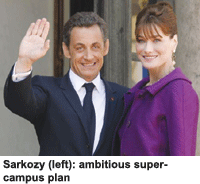President Nicolas Sarkozy often dwells on the need for the French to know their history. He has required teachers to read out a letter written by a 17-year-old Communist resistance fighter to his mother just before his execution. He has proposed that every final-year primary pupil remember a child killed in the Holocaust. He has studded his speeches with references to “crusades and cathedrals, human rights and the revolution”, saying that “there cannot be a nation if there is not a common history.”
 It is strange, then, that his government should decide to scrap history as a compulsory subject in the final year of one of the top three baccalauréats. The 50 percent or so of pupils who take the Bac S which specialises in science and mathematics, have a compulsory two-and-a-half hours of history a week in their final year. But under a new reform, history will become optional, letting budding scientists retreat behind their Bunsen burners untroubled by the cold war or anti-colonialism.
It is strange, then, that his government should decide to scrap history as a compulsory subject in the final year of one of the top three baccalauréats. The 50 percent or so of pupils who take the Bac S which specialises in science and mathematics, have a compulsory two-and-a-half hours of history a week in their final year. But under a new reform, history will become optional, letting budding scientists retreat behind their Bunsen burners untroubled by the cold war or anti-colonialism.
The outcry was instant, and not only from history teachers. Philosophers and other intellectuals signed a petition calling for the reform to be shelved. They expressed “stupefaction”, arguing that, just when Sarkozy has launched a national debate on what it means to be French, the reform would rob students of a critical ability to understand such matters. The opposition Socialists denounced the move as “irresponsible and dangerous”. In a poll, 69 percent of respondents were against the change.
Perhaps the most striking thing about this row is not that French scientists will learn less history. It is that the central government still dictates to all schools exactly how much time to devote to each subject every week, down to the last minute. That is a legacy of Napoleon, who codified the curriculum — classics, history, rhetoric, logic, maths and physics — by an imperial decree in 1808. Don’t expect all of next year’s school-leavers to know that.
(Excerpted and adapted from The Economist)